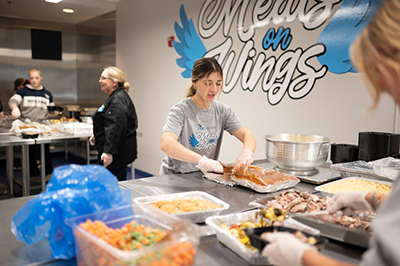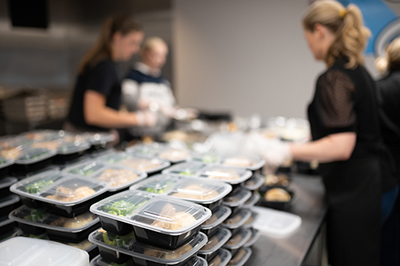Meals on Wings expands to solve hunger crisis
Three days a week, University of North Florida student volunteers collect unused food from local hospitals, prepare and package the food and deliver nutritious meals to low-income, homebound seniors. By the end of each week, they nourish 250 lives.
Meals on Wings has served more than 100,000 meals to Northeast Florida seniors since it was developed in 2017 by the UNF Center for Nutrition and Food Security.
Today, Baptist Health, Mayo Clinic, UF Health Jacksonville, Brooks Rehabilitation and Ascension all donate unused food to the program. For every pound of food received from hospitals, Meals on Wings can make about one meal.
 Meals on Wings drop-offs include at least four meals, salad and fruit weekly to each senior, adding soup and bread when available. The meals come with labels that include when meals should be discarded or frozen and nutritional tips, created by UNF students.
Meals on Wings drop-offs include at least four meals, salad and fruit weekly to each senior, adding soup and bread when available. The meals come with labels that include when meals should be discarded or frozen and nutritional tips, created by UNF students.The program initially went through a big growth spurt during COVID and is now expanding its reach outside of Florida to the University of Kentucky and Lehman College in New York. The funding for the expansion comes from Humana, Meals on Wings’ biggest supporter. The grant is administered by UNF, which provides toolkits for the programs to run in the other states.
Meals on Wings in all three states will run similarly so organizers can track the success of improving food access, food security and nutritional health as the program expands. The goal is to continue to expand so the nation can experience the success that UNF has seen in combating hunger in Northeast Florida for more than five years.
The early days
In the early years, students, faculty and staff volunteers visited local Baptist Health hospitals in Jacksonville to recover food, drove their own cars to bring it back to campus and hauled it up to the small kitchen on the third floor of the Brooks College of Health. There, the group — initially about five or six mostly nutrition students — would package the food and then deliver two meals on Tuesday and another two meals on Friday to the homes of about 20 seniors.
“We saw immediate benefits for the seniors beyond meeting nutritional needs, the program was meeting their mental health needs and combating loneliness by the interactions with our volunteers,” said Meghan Niemczyk, associate director of the UNF Center for Nutrition and Food Security.
Then in March 2020, the pandemic shut down campus. It was clear, however, that the food delivery service couldn’t end, and the community need went through the roof. The number of seniors served rose quickly to 75, then 150, then 250 by 2021.
Dr. Lauri Wright, UNF Department of Nutrition and Dietetics professor and 2022-23 president-elect of the Academy of Nutrition and Dietetics, was the founder of the UNF Center for Nutrition and Food Security and co-founder of Meals on Wings. Dr. Jen Ross, Meals on Wings co-founder and director of programming at the center, and Niemczyk, associate director at the center and Meals on Wings chef advisor, have been involved since the early years. Wright holds the vision and executive functions of the program, Niemczyk focuses on process and daily operations, and Ross handles organization and student engagement.
 Meals on Wings eventually moved into a larger kitchen, which included a walk-in freezer, which allowed them to make sure no food went to waste. On days with extra leftover food, they would freeze it for a slower day.
Meals on Wings eventually moved into a larger kitchen, which included a walk-in freezer, which allowed them to make sure no food went to waste. On days with extra leftover food, they would freeze it for a slower day. Niemczyk attended the Culinary Institute of America and worked in kitchens and catering before transitioning into academia. She uses that background to make sure care and nutrition goes into each meal.
“I don’t ever want someone to feel like they’re eating leftovers,” she said.
In addition to Humana, many other local businesses and individuals have helped UNF's Meals on Wings program with everything from paying for the refrigerated van that transports the food to providing a ramp to help with the loading.
In addition to Humana, many other local businesses and individuals have helped UNF's Meals on Wings program with everything from paying for the refrigerated van that transports the food to providing a ramp to help with the loading.
This summer, the University of Kentucky’s Meals on Wings program will begin serving two meals each week to more than 100 seniors living in subsidized housing. And Lehman College’s Meals on Wings program will serve 30 seniors in the Bronx area with meals that include fruits and vegetables produced by local, minority-owned farms.
Students and seniors share gratitude
Maryam Alnouman’s time at UNF’s Meals on Wings started as a way to get volunteer hours for a class. After just two visits – Alnouman was hooked.
She loved getting to know kitchen workers in local hospitals, working with other students to put together meals and then visiting with seniors and sharing meaningful moments as she dropped off food.
Instead of just a few hours, she continued volunteering for a year. Then she signed up to be a paid student leader for Meals on Wings her senior year, allowing her more time with the seniors she had grown to care about.
Alnouman, 22, graduated from UNF in May with a Bachelor of Science in Nutrition and Dietetics and a minor in psychology, but she is committed to continue working at Meals on Wings as a student lead during the summer. Then she plans to spend a year traveling and participating in service projects in other parts of the world. She credits her inspiration to serve to her time with Meals on Wings.
“Meals on Wings showed me that I can really leave my impact on the world,” said Alnouman.
What each volunteer gets back from their time at Meals on Wings varies but is typically deeply impactful. There are tons of thank yous, hugs and small gifts - sometimes in the form of hand-written notes: “Fantastic!! The cod, sweet potato and Brussel sprout lunch was just divine.” Sometimes a gift of hard candies or hand-sewn potholders is how they show their gratitude. For most of the seniors, these students do so much more than just deliver a meal.
The name Meals on Wings is a play on the school’s mascot, Ozzie the Osprey. But when most seniors see the soaring wings on the logo, they don’t think of just an osprey.
“A lot of seniors call us their angels,” Niemczyk said.
